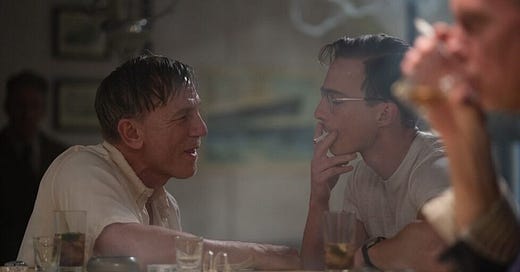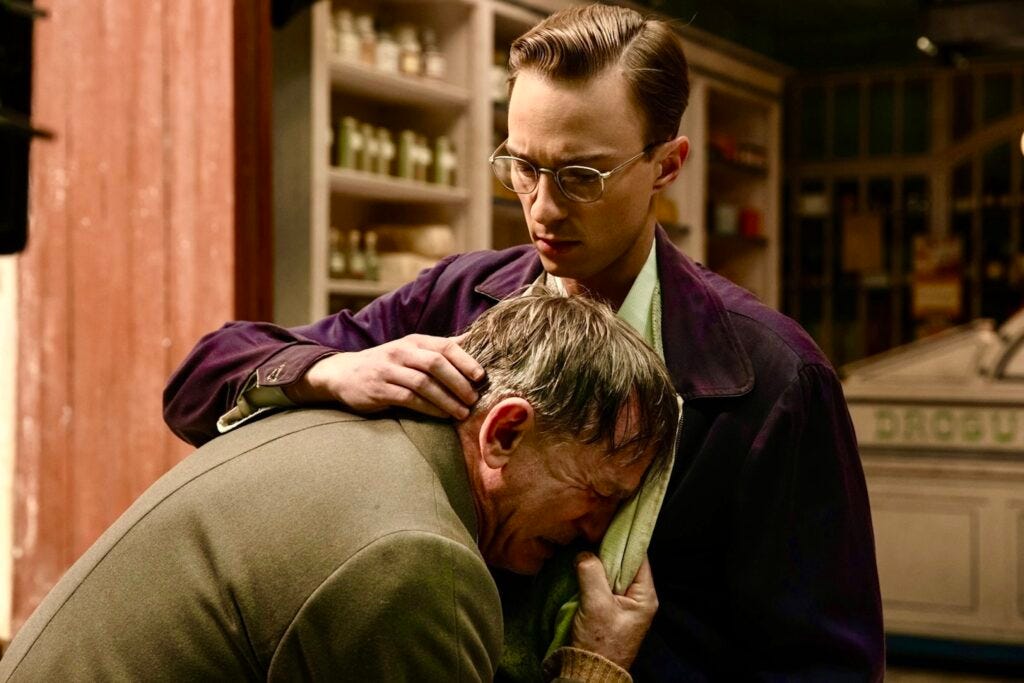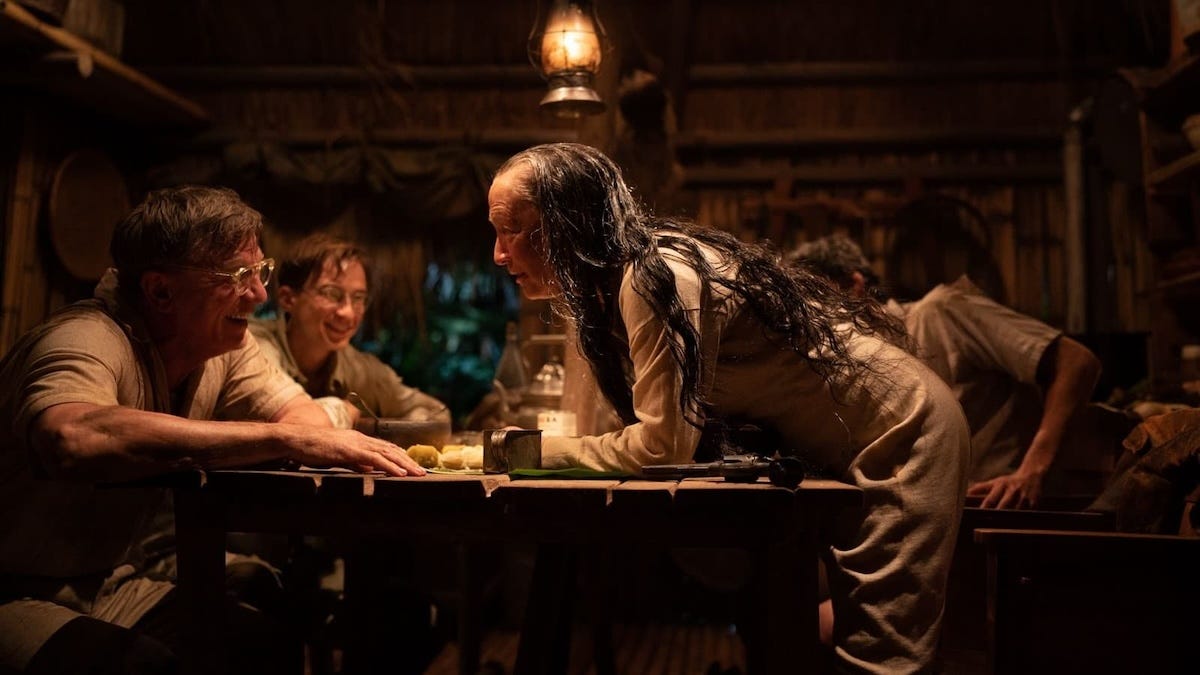Lee (Daniel Craig) and Allerton (Drew Starkey) embarking on their twisty journey
Queer (2024)
In theaters
I don’t believe anybody’s really normal, not deep down in their private lives.
— Noel Coward, Private Lives
I haven’t read the work of William S. Burroughs (1914-1997), an American author. Scion of a wealthy St. Louis family and Harvard-educated, from his mid-twenties he cultivated an outlaw reputation. Over decades I’ve gleaned that he became an outcast, an exile and, at his most mordantly self-expressive, an ardent junkie.
That last descriptor he deployed to title his confessional first novel (Junkie, 1953), so I doubt that anyone ever called him shy. Still, even though the stoned gaze and notorious excesses of a defiant addict seem to have shadowed him most of his life, over his 83 years he was pre-eminently a writer.
Substances, including heroin, cocaine and psychedelics, may have enraptured and ensnared him, but they didn't altogether stop him from hauling his often-emaciated carcass to a typewriter.
Burroughs wrote 18 novels and novellas, six collections of short stories and four collections of essays. For all his shooting up, he wrote down a lot, too.
He was also haunted by his homosexuality. Or was it bisexuality? He was married twice to women and has been quoted declaring he’d never been gay a day in his life and wasn’t part of “any” movement. So much for gay liberation as a motivator.
Nevertheless, his 1985 autobiographical novel Queer (a sort of sequel to Junkie) probes his fascination with male sex hookups and one calamitous man-on-man affair during a period in the 1950s that Burroughs spent both in Mexico and Ecuador prowling for mind-expanding drugs.
The gay director Luca Guadagnino (Call Me by Your Name, Challengers) has testified that reading Queer in his youth helped him embrace his sexual identity, and in his ninth feature he fulfills a long-held desire to bring Lee, the novel’s tormented protagonist, to the screen.
The movie (with a script by Justin Kuritzkes) has that air of personal wish fulfillment going for it. The camera moves dreamily, almost nostalgically, though it’s not Luca’s life we’re looking at.
We’re meant to understand that Lee (Daniel Craig) is hypnotized, tugged along, not entirely in control of booze and drugs’ grip on him or the feelings they crack open inside him.
Around age 50, Lee cuts a comic figure ogling men 20 or more years younger than he is, and Craig works carefully to give this literate, cultivated outsider an absurd gallantry in Mexico City’s bars and restaurants.
This silly expatriate – the British Craig gleefully squalls Lee’s broad American vowels – seems mostly an amiable lush. Luca and Kuritzkes suggest he wouldn’t harm a fly, and his goofiness apparently isn’t off-putting to the locals.
The movie is gorgeously shot (by Sayombhu Mukdeeprom) both in Rome, on sets tidily designed to represent 1950s Mexico City, and in Ecuador, with the capital Quito also serving as the Mexican capital and providing the country’s vine-laden tropical forests as a lure in Lee’s journey.
But who is this brazen, sozzled quasi-bohemian cruising the city’s gay bars? The novel Queer is described as autobiographical, and it would seem the movie draws on the real-life Burroughs though it makes scant mention of Lee as a writer (there’s only one shot of a sheet of paper in his typewriter).
So, is it self-exploration or self-indulgence that makes Lee awkwardly court a handsome, enigmatic young Englishman? Eugene Allerton (Drew Starkey) is casually, tastefully dressed and often seen laughing in the company of a smiling, black-gowned, red-headed woman.
Lee is captivated, and Allerton, his source of personal income not entirely clear, seems to have nothing much to do. He takes up with the besotted American as something of a lark.
But Lee will settle for nothing less than devotion in return. As they explore sex, first playfully, then avidly, the older man falls headlong into helpless fascination with Allerton’s youth. He can’t believe his good luck.
The script turns Lee’s physical obsession into a truth-facing turning point. He pledges to monetarily support Allerton, though not extravagantly, and to demand sex no more than twice a week. The shrewd young hedonist agrees to the terms.
Lee plumbs depths he couldn’t foresee, while Allerton senses a pact spinning out of control
We intuit that this muscled, sophisticated younger man isn’t remotely a gigolo, and consorting with Lee is just “something to do” until his next opportunity – in a career or just working a boring conventional job – comes along.
He agrees to explore sexual positions and roles with Lee, never protesting (though nothing we see is darkly kinky).
With a what-the-heck abandon, he also agrees to accompany Lee on a search for the ultimate mind-expanding drug yagé, from which the psychoactive brew Ayahuasca can be made.
It’s said to be cultivated in a remote region of Ecuador by a renegade botanist, Dr. Cotter (Lesley Manville, unrecognizable in countercultural drag with flowing tangled locks, and fun to watch).
The extravagantly gifted Italian director’s work here is stately, his commitment inarguable. The compositions are elegant, the pop-art colors alluring, and the deliberate pace respects the emotional trauma we’re invited to believe Lee is undergoing.
Without a guide, the pair venture deep into the dense rain forest and find the gun-toting rebel Ph.D. living in a thatched cabin with her devoted Ecuadorian husband (Lisandro Alonso).
She’s not about to reveal all of yagé’s powerful secrets and informs the two seekers they’ll simply have to find out for themselves how it expands the mind.
They do. And does it ever. Before they know it, their organs appear to spill out of their bodies, and they drift into a hallucinogenic trance that gets them uttering murky secrets and dreams to each other.
Lesley Manville (c.) is the wild scientist dispensing the mind-expanding drug yagé
One crucial proclamation floats to the top of Allerton’s fevered mind, spoken directly to Lee: I’m not queer.
Wait a minute. Does Allerton mean he’s not gay? No, we’ve seen them in various sex couplings, so we know he swings that way at least some of the time. Bisexual? But Lee already knew that, and Allerton’s never hidden his desire for women.
We take something far more ominous for Lee from Allerton’s declaration. The old-fashioned meaning of “queer”, as in “an odd misfit, one who belongs nowhere” ripples across Lee’s face, slamming into his consciousness. The uncoupling begins.
Alas, for all Lee’s flailing, I felt nothing for him. A mere departure from normalcy, which is the summation of Lee’s behavior we see on screen, can’t begin to define anyone. We all do it.
As Noel Coward has it in Private Lives, his arch, sophisticated 1930s bauble of a play, we’re all saddled with being different, distinct, one of a kind. For all our conformity, there’s no eliminating our queerness, in either the old or the new meaning of the word.
How we exploit our uniqueness, which can mean concealing or camouflaging pieces of it, is what distinguishes us from one another.
In doing so, some people of course are brave. The act of writing, which Burroughs steadfastly pursued, can be brave. But wallowing in physical pleasure and swallowing drugs or shooting them into your veins to ease the pain of feeling different? Not so much.
That’s all we see Lee do. Cover up his difference by ingesting chemicals, declining to venture into a life consciously, if not always wisely, chosen.
And the script never points out any price Lee pays for his non-choices. Loneliness isn’t necessarily a price; ask loners who end up creating major advances. And passivity while drowning in loneliness isn’t tragic, which is the false “nobility” Luca-cum-Burroughs seems to be trying to peddle in this movie.
Look, I’m not here to question Luca’s choice to venerate Burroughs or the novel Queer, which I’ve yet to read. Each man’s writer heroes are his own. Among mine in the course of coming out were the John Rechy of City of Night, the James Baldwin of Giovanni’s Room and Another Country, and the Christopher Isherwood of A Single Man.
It seems Luca’s early reading of Burroughs provided life-altering insights. I don’t doubt the director’s sincerity or question his wish to honor the interior thrashing of a man coming to terms with his sexuality.
But the Lee we see here is running from the responsibility of a life honestly embraced. Notably, Luca himself, if he ever made that mistake, has triumphantly changed course and built an astonishing career.
Sex and drugs aren’t liberating Lee but detaching him from reality. If that’s the lesson to be learned here, it failed to move me, though it obviously deeply affects Luca. Why he dwells on it is the most enduring question the movie left me with.
Laying that aside, the extravagantly gifted Italian director’s work here is stately, his commitment inarguable. The compositions are elegant, the pop-art colors alluring, and the deliberate pace respects the emotional trauma we’re invited to believe Lee is undergoing.
That’s vividly brought home in Craig’s quite charming, then alarming, portrayal. The actor is all in, not just in the sex and drug moments, but in Lee’s clumsy, aching efforts to be understood.
Starkey is skillfully restrained as Allerton. The character’s sophistication signals he’s no rent boy, and the actor never makes it seem as though Allerton is being taken in by an older man’s money and lust.
Allerton doesn’t press Lee for money. He’s 1950s hip – mellow – in a way the hyperactive, gawkily yearning Lee isn’t. The younger man is on one of life’s “trips”, and he’s willing to pay his, hopefully not too damaging, dues. Hooking up with Lee is an experiment, not a quest.
It’s fascinating to think about how deeply Luca has pondered a man like Lee over the years and seen him as a key to his own growth.
I recognize the impulse. Rechy, Baldwin and Isherwood have served a similar function for me. But their protagonists carefully weighed each commitment they took on or chickened out of.
Lee here is left adrift. Wondering, as when we first met him, what it’s all about. Sighing or screeching that he’s not, and has long since given up trying to be, normal.
Welcome to the club. But I’m not sure it takes most of us precisely his sort of immature sound and fury — signifying so little — to feel the same.







In the book Lee almost dies of uremia dfrom rinking away his sadness and opiate withdrawals (which never works btw) so maybe that's the cost, too unaesthetic to make the film. Queer's not Burroughs' best book, it does fizz out plot wise, start with Junkie or The Naked Lunch which are truly entertaining.